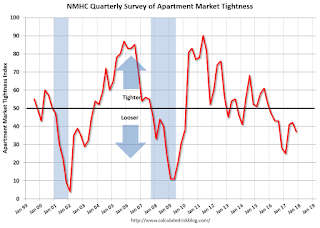by Calculated Risk on 10/23/2017 02:19:00 PM
Monday, October 23, 2017
NMHC: Apartment Market Tightness Index remained negative for Eighth Consecutive Quarter
From the National Multifamily Housing Council (NMHC): Apartment Markets Decline Slightly in the October NMHC Quarterly Survey
Market conditions for the apartment industry remained soft in the National Multifamily Housing Council’s (NMHC) October Quarterly Survey of Apartment Market Conditions. While the Market Tightness (37), Sales Volume (45) and Equity Finance (46) Indexes remained below the breakeven level of 50 – with the Debt Financing Index (51) edging just above 50 – there was little change compared with three months earlier.
“The apartment market is headed into a seasonally slow leasing period with new deliveries easing upward pressure on rents and occupancy rates in many markets around the country,” said NMHC Chief Economist Mark Obrinsky. “The big increase in multifamily starts in 2015 and 2016 is finally filtering through to the marketplace on a broad basis.”
“Leasing activity appears to have picked up in Texas and Florida in the aftermath of Hurricanes Harvey and Irma. Some respondents also noted that fires on the West Coast may be pushing occupancy rates up,” said Obrinsky. “Elsewhere, new deliveries are leading to concessions becoming more commonplace.”
The Market Tightness Index decreased from 42 to 37, marking the eighth consecutive quarter of overall declining conditions. Forty percent of respondents reported looser conditions than three months prior, compared to just 14 percent who reported tighter conditions.
emphasis added

Click on graph for larger image.
This graph shows the quarterly Apartment Tightness Index. Any reading below 50 indicates looser conditions from the previous quarter. This indicates market conditions were looser over the last quarter.
As I've mentioned before, this index helped me call the bottom for effective rents (and the top for the vacancy rate) early in 2010.
This is the eighth consecutive quarterly survey indicating looser conditions - it appears supply has caught up with demand - and I expect rent growth to continue to slow.


